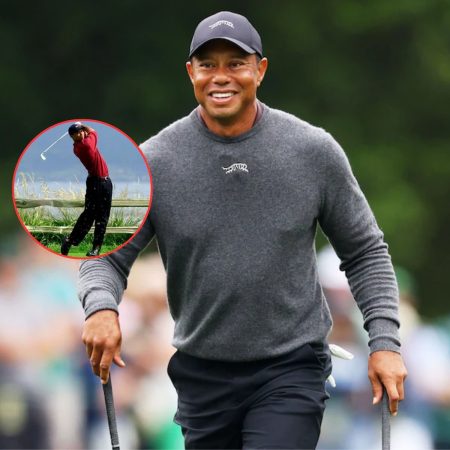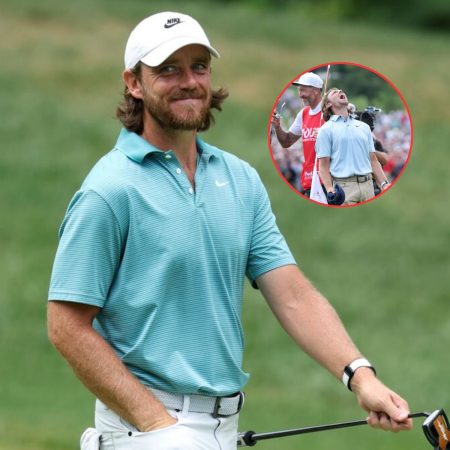Jon Rahm isn’t fully sold on the recent leadership changes at the PGA Tour. While many in the golf world welcomed Scott O’Neil and incoming leader Brian Rolapp with optimism, Rahm offered a more grounded view. Speaking before LIV Golf Dallas 2025, the Spanish golfer pointed out that personal ties like Rolapp and O’Neil’s shared Harvard history might help communication, but real decisions are made by people higher up. “Things are never as simple as they seem,” Rahm said, adding that while he hopes their bond helps, deeper issues could still stop the LIV–PGA Tour relationship from truly moving forward, an outcome that, in Rahm’s view, isn’t entirely in their hands. Rahm is not the only one with a cautious outlook on the leadership change.

Recently, on the 5 Clubs podcast, Lee Westwood shared his perspective. Before getting into the real problems, Westwood starts off on a polite note, saying, “I think it’s good that the PGA Tour are getting a new uh um leader, you know, the leadership’s changing there. I think that’s good.” A leadership change, Brian Rolapp is taking over as CEO of the PGA Tour in 2025, with Jay Monahan set to step down by the end of 2026. According to Westwood, it gives the game a chance to hit reset. After everything that’s gone down between the PGA Tour and LIV Golf, having new people in charge could help shift the tone, maybe even open the door to better conversations.
But that hopeful tone doesn’t last long. Westwood quickly gets real, pointing out the deeper issues that could still hold everything back.
“the trouble is when you you you’re dealing with the same people…there’s issues in the background..somebody’s upset about something that’s gone on before and you need to come into it with in a very factual way” Westwood said, hinting at the lingering tension and bad blood that still surround the PGA Tour–LIV Golf situation. According to him, some people are still upset about how things played out in the past, and that emotional baggage hasn’t gone away. So, even if a new CEO steps in with good intentions, those unresolved issues could easily get in the way and derail any serious attempt to rebuild the relationship between the two sides. Westwood believes that unless both parties come to the table with a clear, factual mindset not driven by personal grudges, progress will be nearly impossible.
🚨JUST IN: The PGA TOUR – PIF framework agreement that flipped professional golf on its head has been obtained by @TheAthletic with the senate subcommittee hearing looming. We’ve summarized the key points :
— The deal is 6 pages in length
— Future of LIV Golf remains uncertain… pic.twitter.com/3u1ykbd2fi— NUCLR GOLF (@NUCLRGOLF) June 27, 2023
While he didn’t name names, his comments about past decisions being clouded by emotion point straight to Jay Monahan. During his time as PGA Tour commissioner, Monahan made several major calls that felt more emotional than strategic, something that not only strained relationships with LIV Golf but also created mistrust within his own camp.
How Jay Monahan made some emotional decisions…
In 2022, when LIV Golf began pulling top PGA Tour players with massive contracts, Jay Monahan responded by suspending those who joined. It was a strong move, likely driven more by emotion than strategy. He wanted to protect the Tour’s image and send a message, but the decision backfired. It led to lawsuits, increased tension, and pushed both sides further apart.
Then, in June 2023, something completely unexpected happened. After nearly two years of fighting, Monahan and the head of LIV, Yasir Al-Rumayyan, appeared together on national television to announce that the PGA Tour and LIV Golf had agreed to work together. The news came as a shock, especially to the players who had been kept in the dark. Even big names like Tiger Woods and Rahm were not informed about the deal in advance. Many of them felt confused and betrayed.
Although he said the agreement would be finalized by the end of 2023, that deadline passed without any deal. LIV Golf continued signing more players, and the relationship between the two sides remained unstable.
Now, with Monahan stepping back from the spotlight and a new leadership team stepping in, the damage is still there. He may be out of the picture, but he’s left behind a complicated mess, one filled with mistrust, fractured relationships, and a merger that still hasn’t crossed the finish line. Can Brian Rolapp? Fix this with time?





